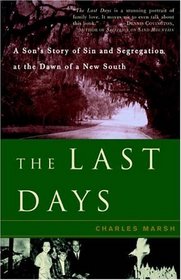The Last Days: A Son's Story of Sin and Segregation at the Dawn of a New South offers a compelling new version of an old story: how good people acquiesce to evil, and then find strength to overcome it. At his best, author Charles Marsh (God's Long Summer) recalls the elegiac prose of Southern writers such as Harper Lee. His memoir begins radiantly:
One spring afternoon in 1967, when the warm Alabama air was perfumed with honeysuckle and scuppernong, my father and I were walking along a dirt path through fields of green wiregrass. With his hand brushing lightly against my shoulders, he told me the Lord was calling us to Mississippi, to blessings more abundant than we could ever imagine.
In Laurel, Mississippi, Bob Marsh, a prominent Baptist preacher, took the pulpit of a comfortable congregation in a comfortable town where the leading citizens included Sam Bowers, the Imperial Wizard of the White Knights of the Ku Klux Klan. Lulled by the luxuries of the good life, Reverend Marsh and his congregation initially believed the civil rights movement was a political matter, not a spiritual one. The slow erosion of their prejudice and dawning of enlightenment is precisely and graciously detailed in The Last Days. The book is also a fine and poignantly humorous evocation of many aspects of daily life in a small Southern town in the late 1960s and early 1970s.
One spring afternoon in 1967, when the warm Alabama air was perfumed with honeysuckle and scuppernong, my father and I were walking along a dirt path through fields of green wiregrass. With his hand brushing lightly against my shoulders, he told me the Lord was calling us to Mississippi, to blessings more abundant than we could ever imagine.
In Laurel, Mississippi, Bob Marsh, a prominent Baptist preacher, took the pulpit of a comfortable congregation in a comfortable town where the leading citizens included Sam Bowers, the Imperial Wizard of the White Knights of the Ku Klux Klan. Lulled by the luxuries of the good life, Reverend Marsh and his congregation initially believed the civil rights movement was a political matter, not a spiritual one. The slow erosion of their prejudice and dawning of enlightenment is precisely and graciously detailed in The Last Days. The book is also a fine and poignantly humorous evocation of many aspects of daily life in a small Southern town in the late 1960s and early 1970s.




